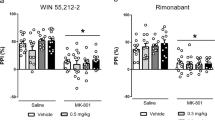Abstract
Rationale. Phencyclidine (PCP) binds with high affinity to a site located within the ionophore of N-methyl-D-aspartate (NMDA) receptors. Previous studies have demonstrated that PCP and other high-affinity NMDA channel blockers reliably disrupt prepulse inhibition (PPI) of acoustic startle, an animal model of sensorimotor gating used to study attentional deficits associated with schizophrenia. Recently, a number of low-affinity NMDA channel blockers that exhibit minimal PCP-like effects in humans at therapeutic doses have been developed.
Objectives. The purpose of this study was to evaluate the effects on PPI of NMDA channel blockers with varying affinities for the channel site as well as different specificities for NMDA receptors.
Methods. Sprague-Dawley rats were presented with multiple stimulus presentation trials, including pulse-alone and PPI trials.
Results. As expected, the high-affinity ligands dizocilpine and dextrorphan disrupted PPI at doses that did not affect the response during pulse-alone trials. Low-affinity drugs produced a mixed pattern of results. Whereas dextromethorphan and memantine disrupted PPI, orphenadrine, amantadine, desipramine, and alaproclate did not affect this response. Ibogaine also disrupted PPI, but only within a dose range that severely decreased the startle response during pulse-alone trials.
Conclusions. These results suggest that not all NMDA channel blockers share PCP's effect of PPI disruption. In addition, they suggest caution in the use of supratherapeutic doses of these compounds and in their use in vulnerable populations (e.g., schizophrenic patients).
Similar content being viewed by others
Author information
Authors and Affiliations
Additional information
Electronic Publication
Rights and permissions
About this article
Cite this article
Wiley, J.L., Harvey, S.A., Balster, R.L. et al. Affinity and specificity of N-methyl-D-aspartate channel blockers affect their ability to disrupt prepulse inhibition of acoustic startle in rats. Psychopharmacology 165, 378–385 (2003). https://doi.org/10.1007/s00213-002-1297-6
Received:
Accepted:
Issue Date:
DOI: https://doi.org/10.1007/s00213-002-1297-6




